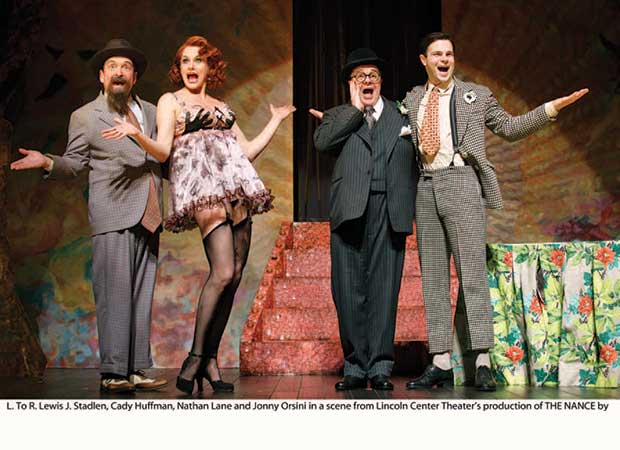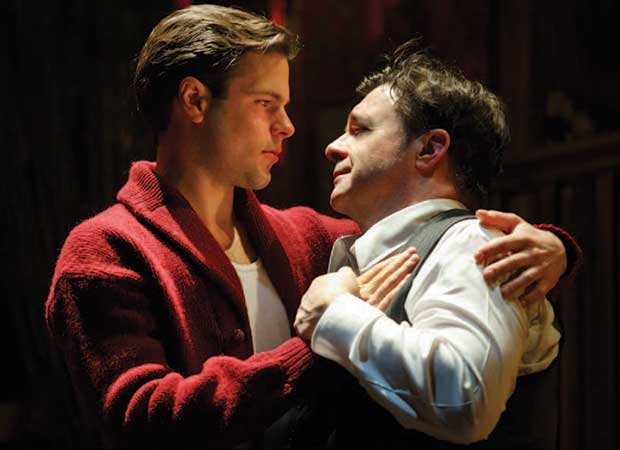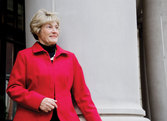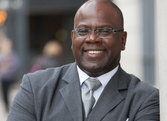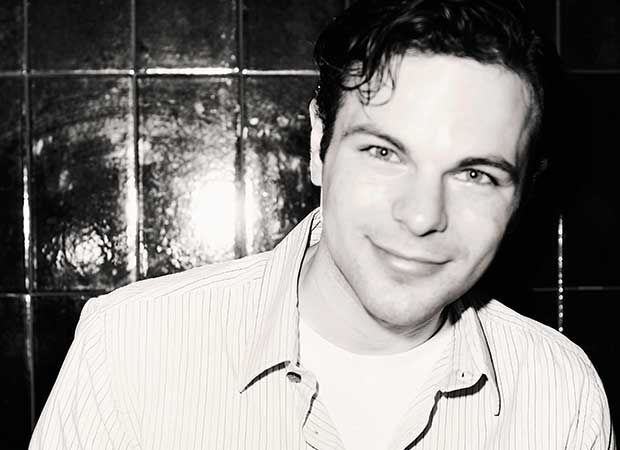
When Jonny Comes Home
FROM BOSTON TO BROADWAY, SHOOTING STAR JONNY ORSINI BS '07 MAKES HIS TRIUMPHANT RETURN
By Janice C. Simpson
When Jonny Orsini arrived at Suffolk University in the fall of 2003, he had never seen a professional play or even performed in a grade school or high school production, except for the one-act that he says he and some friends put together as a lark at the end of their senior year. But within a month of being on campus, Orsini, who originally planned to study journalism, switched his focus to theater, seduced by its more visceral style of storytelling. "I saw what it could be and I was immediately like, 'This is it,'" he says. "And I went at it 110 percent and kind of haven't stopped since."
Indeed, Orsini made his professional debut in the summer between his junior and senior years and this past spring, just six years after graduating from Suffolk, he opened in the original Broadway production of The Nance, co-starring opposite two-time Tony winner Nathan Lane. This fall, the 27-year old actor will be back on Broadway as Malcolm, the prince who brings down Macbeth in a production headlined by Ethan Hawke.
It’s the kind of success that thousands of young actors dream of but very few achieve. For talent is only a part of what it takes to make it in show business. An actor also needs the luck of being in the right place at the right time, the pluck to know how to make the best of it when he finds himself there, and that ineffable quality known as stage presence. Orsini has the full package. “People who succeed not only understand the show, but understand the business,” says Marilyn Plotkins, theatre department chair at Suffolk. “Jonny understands both seamlessly.” (Read a first-person account by Plotkins about seeing Orsini perform on the Broadway stage.)
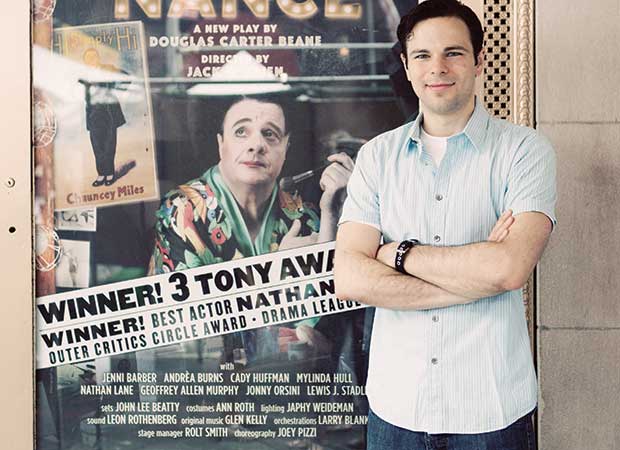
Taking the Leap
Orsini grew up in the small town of Cheshire, Connecticut where his dad served as mayor for eight years and his mother was an accountant. (Today, they both work in sales and his only sibling, Julie, a new mom, has given Orsini a welcome new role as uncle). He admits that he was a bit overwhelmed by finding so many new faces when he got to Suffolk. One of the first people he happened to meet was a theater major who introduced him to other students in the department. Orsini, then known by his full name Jonathan, reveled in the camaraderie he found there. “It was just the most welcoming place,” he remembers.
The welcome, however, didn’t extend to his being cast in that fall’s first big show,a production of Eugene Ionesco’s absurdist play Rhinoceros directed by Professor Wesley Savick. There were roles for about 40 actors but, says Savick, “Jon was No. 41.” He was, in fact, the only one who auditioned that didn’t get a part in the show. “I don’t want that to reflect either on his sort of nascent talent or my blindness and stupidity,” jokes Savick. Undaunted, Orsini volunteered to work the lighting board just so that he could be a part of the experience.
He did get parts in subsequent productions,but they were mainly supporting roles and Orsini was hungry for meatier stuff. When he heard that Plotkins was planning to direct a production of You Can’t Take It With You, the 1937 Pulitzer Prize-winning comedy by Moss Hart and George S. Kaufman, he asked her if he could play the romantic lead.
Such starring roles are usually reserved for seniors, and Orsini was just a junior. Although she appreciated his moxie, Plotkins turned him down, giving him a smaller but featured role instead and, she recalls, “he was excellent in it.”
But he was also still on the hunt for bigger challenges. So Orsini got himself an audition at Company One, a professional theater company in Boston that was looking for a young actor to play the lead in After Ashley, Gina Gionfriddo’s drama about a teen who is forced into the media spotlight when his mother is killed.
Orsini didn’t have much experience but, recalls Company One’s artistic director Shawn LaCount, he did have “an honest, vulnerable stage quality. It sounds simple but it’s actually something quite rare.” Orsini not only got the part, he earned rave reviews (“He’s going to be big, big, big. See him while you can,” declared Sandy MacDonald on EdgeBoston.com,) and he picked up a nomination for an Independent Reviewers of New England, or IRNE, Award as Best Actor.
Roles in other local productions followed, including the SpeakEasy Stage Company production of The Little Dog Laughed, Douglas Carter Beane’s comedy about a young movie star who’s in the closet. Orsini was cast as the gay hustler who draws him out, and he admits that he was initially uncomfortable in a role that required him to be nude onstage and to kiss another man. But, he says, “part of my maturing as an actor was just to get used to that and be OK with it.”
He stepped up and did such a worthwhile job that when the run ended, Hartford TheaterWorks asked him to play the same role when the actor it had cast left for an emergency appendectomy. The next logical step seemed a move to New York. Orsini took the leap.
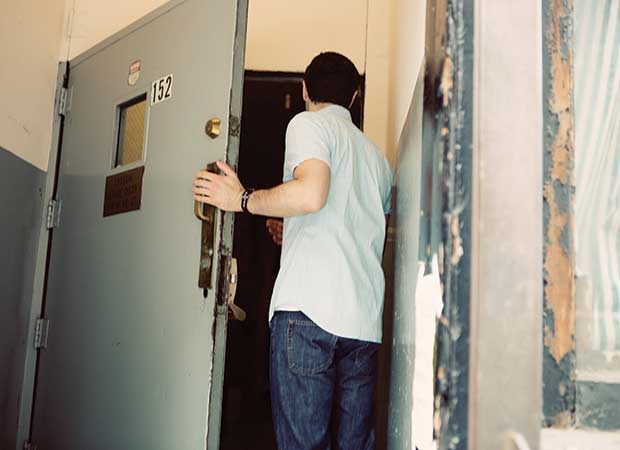
A New Chapter
The initial landing was shakier than Orsini expected. He didn’t know anyone in the city, so there was no one around to show him the ropes. Other young actors who had gone through conservatory programs at places like Juilliard or the Yale School of Drama “had a safety net of their friends that they spent years with,” he says. “I definitely didn’t have any of that.”
So once again, Orsini took the initiative. He heard about a small film that was looking for a young actor to play a Marine returning from Afghanistan with PTSD and he thought the part “would be perfect for me.” But he also figured there was no way he could get an audition since he didn’t have an agent. So he recorded a monologue, posted it online, and then tracked down the director, Lauren Wolkstein, on Facebook and sent the link to her along with a plea for her to watch it.
He got the part and the film, Cigarette Candy, won enough honors on the festival circuit to earn Orsini an agent who was able to get him shots at higher profile roles, including the lead in the Lincoln Center Theater production of War Horse. He didn’t get that part but he still impressed the company’s casting director.
“He was always really special and unique,” says Daniel Swee, who heads up casting at Lincoln Center. “There was always something really honest about his work. And there’s a vulnerability to him that’s compelling.” Swee brought Orsini in for other roles but none clicked.
All the while, Orsini continued to hone his craft. He studied with Terry Schreiber, an acting teacher who had coached Edward Norton and Peter Sarsgaard. “I’m sort of a little more old-fashioned about just learning by doing more shows,” Orsini says. “But when I went to him was the first time I really dug into how to get into what acting is and creating characters and not just going off of just pure instinct.”
He carefully chose his day jobs, opting for part-time work as a host at a restaurant instead of more lucrative positions as waiter or bartender because, he says, he didn’t want to fall into the trap of other actors he’d seen who got so used to the money they brought in that that they couldn’t afford to take a $300-a-week acting gig in an off Broadway show. He also changed his stage name from Jonathan to Jonny.
“It wasn’t like I moved to New York, now let me reinvent myself,” he says explaining the decision. “But it was kind of coinciding with me shedding skin. And my girlfriend who I was with at the time, she would call me Jonny and I liked it. It was just time for a new chapter of my life and becoming the person I wanted to be.”
